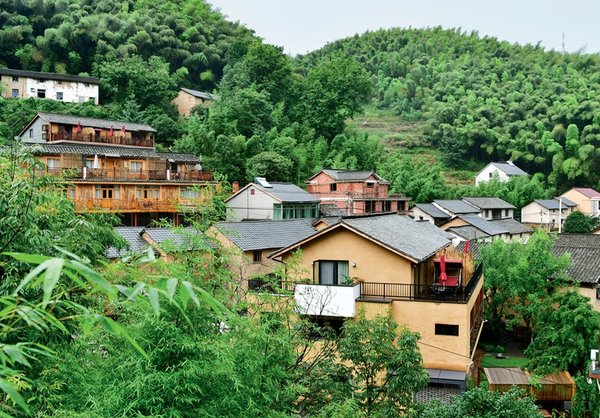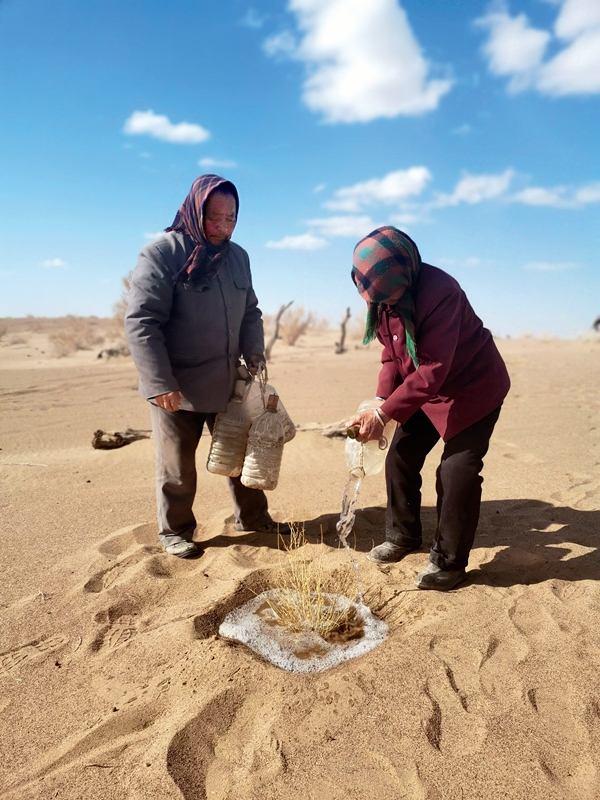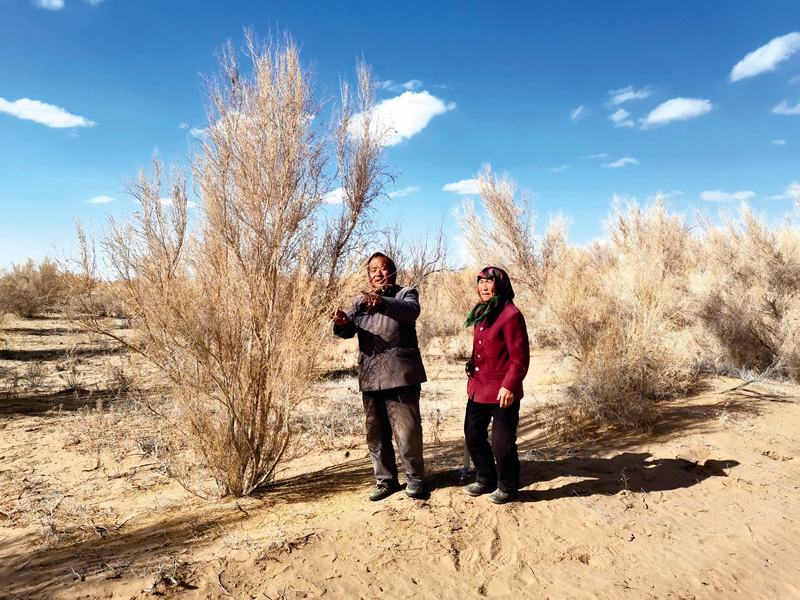Live a Green Life: Make Your Home More Beautiful
 |
Green is the symbol of life, and the background color of nature. It represents people's pursuit of a better life. Nowadays, being green, simplistic, saving energy and living a low-carbon lifestyle have become the priorities of many people. These people take practical actions to become eco-friendly families, create harmonious family traditions, enjoy beautiful lives and contribute to the building of a beautiful China.
The All-China Women's Federation (ACWF) in May 2019, in Beijing, launched a project to promote the health and happiness of families, and it honored the 2019 national most beautiful families. The project was intended to implement the spirit of the 19th National Congress of the CPC (Communist Party of China), respond to the needs of families and coordinate efforts of women's federations, at all levels, in conducting family related initiatives.
The project includes four major components: Building family civilization, supporting family education, improving family services and strengthening family research. In terms of building family civilization, ACWF will continue conducting public activities to look for the most beautiful families and to build eco-friendly families. The ACWF will also guide families in building good families, promoting family education and cultivating family traditions.
In recent years, China has organized various activities to promote the development of eco-friendly families, and many families have stood out during the activities. Members of the families live green and low-carbon lifestyles, and they participate in various public-benefit activities related to environmental protection. They educate and influence their children through their own habits and behavior. Living a green lifestyle has become a tradition of their families.
A retired elderly couple, Tububatu and his wife, Taoshengchagan, has planted trees during the past 18 years to fight desertification in North China's Inner Mongolia Autonomous Region.
Song Wei, a volunteer in Xiangtan, in Central China's Hunan Province, has long been dedicated to protecting the Xiang River, which runs through the city. To help raise people's awareness of environmental protection, Song and his wife, Liu Yuan, even took wedding photos near the sewage outlet to the river.
"Environmental protection starts with me" is one of the mottoes of Deng Xiaohong's family. Deng's family lives in a village in Ganzhou, in East China's Jiangxi Province. Deng and her family members have promoted garbage classification in the village since 2003. Countless eco-friendly families are the major force in the building of a beautiful China.
Tububatu's Family Fights Desertification, Safeguards Home
 |
| Tububatu (Front, L) and his family |
Each spring, an elderly couple is often seen planting trees near Guranay Lake, which is located on the edge of Badain Jaran Desert, in Alxa League, in Inner Mongolia Autonomous Region. The couple is 69-year-old Tububatu and his wife, 68-year-old Taoshengchagan. They have planted trees, to combat desertification, for the past 18 years.
Planting Trees
Tububatu returned from Ejin Banner, in Alxa League, to work in his hometown, Guranay, in 1983. "When I was little, reeds and sacsaoul trees were almost everywhere in Guranay, making it a green world. But, in the 1980s, the sandstorms often hit Guranay, and the Guranay Lake was shrinking. The deterioration of the ecology made me feel sad," he recalls.
After Tububatu retired, in 2002, he and his wife decided to fight desertification in Guranay. They began planting trees on a section of desert that covered 2,000 mu (1.33 square kilometers).
At first, the survival rate of the trees they planted was low. So, they bought and read books on how to plant trees in the desert, and they asked professionals for assistance. Soon, they mastered the methods and techniques of planting trees in a desert.
The couple chose to plant wind-proof, sand-fixation sacsaoul trees. The heat-resistant trees could endure drought and resist salt and alkali.
To save costs, they bought seeds to breed seedlings on their own. They fetched water from a well, several kilometers away, to water the trees.
It was usually windy during spring, so they planted trees when the wind was not strong. Summer was the season to water sacsaoul trees. To ensure the trees' survival, they watered the trees at least three times a year.
During the past 18 years, they have spent more than 1 million yuan (US $142,857) of their savings on planting trees. More than 80 percent of the section of desert that covered 2,000 mu has been planted with trees.
To date, they have planted more than 70,000 trees, and the survival rate has been more than 95 percent. Their story has touched numerous people, and many of those people have visited Guranay to help them plant trees.
Tububatu has also improved the method of planting cistanche. He has shared his technique with local herdsmen, to help them improve their incomes.
Tububatu's family in 2015 was honored as one of the National Most Beautiful Families by the ACWF. The next year, his family was designated a National Civilized Family (an honorary title). "I feel happy that I can do something for my hometown," Tububatu says.
 |
| Tububatu and his wife, Taoshengchagan, are planting trees. |
Green Dream
The couple looks older than their age, due to their years of working in fields. In 2010, Tububatu became seriously ill, and he needed two surgeries.
The doctor suggested Tububatu should have a good rest, and that he should avoid doing heavy work. But Tububatu didn't quit planting. "I miss the sacsaoul trees. I must take good care of them, and I must prevent their roots from being eaten by animals, such as mice and rabbits," he said at that time.
In 2011, Taoshengchagan suffered a cerebral hemorrhage, and she lost the ability to care for herself. After several years of recuperation, Taoshengchagan could walk again.
Guranay suffered a drought in 2012. Tububatu borrowed 30,000 yuan (US $4,286) from his relatives to dig a well.
Tububatu's children have been impressed by his persistence in fighting desertification. His eldest daughter, Honggerzhula, bought a truck to help him carry water and seedlings. Their son, Galaxionghaoer, helps the couple plant trees and fix the fences when he returns home for a visit.
Their youngest daughter, Honggerchaoge, who lives nearby, often visits the couple, and she helps them take care of the trees. "When I was little, I didn't understand my father. But now, I understand why my parents persist in planting trees. They are not for themselves. They are building a green homeland for future generations," Honggerchaoge says.
Tububatu and his wife have been married for more than 40 years. "I think a husband and wife should respect, understand and tolerate each other. Only in this way can they live a better life. Parents should help their children develop good personalities and educate them to love their motherland and hometown … I have faith in my heart, and I have a harmonious family as my strong backup. That has been the greatest blessing of my life," Tububatu says.
Last year, he began planting trees on another section of desert, covering 2,000 mu. "My goal is to plant trees covering an area of 10,000 mu (6.67 square kilometers)," he says.
 |
| Tububatu and his wife, Taoshengchagan |
Please understand that womenofchina.cn,a non-profit, information-communication website, cannot reach every writer before using articles and images. For copyright issues, please contact us by emailing: website@womenofchina.cn. The articles published and opinions expressed on this website represent the opinions of writers and are not necessarily shared by womenofchina.cn.






.jpg)

 WeChat
WeChat Weibo
Weibo 京公网安备 11010102004314号
京公网安备 11010102004314号